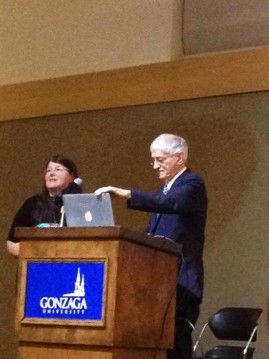
I had the pleasure of attending the John Crossan talk at Gonzaga University last week, which I learned about first from one of my young atheist friends at the Eastern Washington University Atheists (who drew on the SpokaneFAVS announcement for information on it, by the way). The first meeting of their group this school year happened to be on the same day as Crossan’s talk, and as I was attending to liaison with them regarding our Spokane Secular Society and Inland Northwest Freethought Society, I gave a lift to several of their members who wanted to attend but didn’t have transportation.
The venue was not in the larger auditorium that other speakers have had there (for example, when Gonzaga President Spitzer spoke a fear years back on how his field of quantum physics supposedly undermined the reduction of mind to brain systems), but the talk was well attended with only standing room left at the end. I was rather surprised to hear from Crossan that this was his first appearance in Spokane or at Gonzaga, which may say something about the position he plays in the Catholic world. There was no sign of protests or disapproval at the venue, and the audience was quiet and respectful, but not exactly crackling with excitement either (including one jock type slipping out early with skateboard in hand), unlike Crossan himself, who was spry and engaging despite having entered seminary around the time I was born back in the early 1950s.
Crossan was labeled as a “controversial” figure even here at Spokane Faith & Values, but I think that is going rather far. It is fair to say that he comes from a quite liberal view of how Christians are to act in modern life, as well as trying to ferret out what Jesus did or did not believe that puts him at odds with more traditional biblical apologetics. He was part of the Jesus Seminar’s annotated New Testament, for example, that parsed which statements were, by their consensus, more or less likely to “really” be Jesus’ views (a revisionist exercise with a long pedigree to it, with Thomas Jefferson taking a stab at it back in the 18th century with his Jefferson Bible).
When it comes to Crossan’s attention to the historical details, though, he proved both informative and entertaining, drawing on as far ranging a field of historical information as someone like Bart Ehrman might (I attended Ehrman’s recent show at the FOX). The topic of Crossan’s talk was specifically on St. Paul and his view on the role of women in the church’s body of Christ and how he was not so “appalling” as some have painted him.
I must say I have not had a high opinion of Paul, regarding him as a tough cookie who was an ideologue as Saul and remained so even as he switched gears on that road to Damascus, which made the thrust of Crossan’s talk something of a jolt. Crossan’s argument turned on something that is not really controversial among mainstream biblical scholars: that some of the epistles attributed to Paul were likely later forgeries. Where Crossan was genuinely enlightening was in contrasting the views of Paul on women in the more certainly Pauline texts with that of the later problematic ones, suggesting that the earlier Paul was far more egalitarian when it came to women’s place in the church than the “Paul” presented in the later attributed material, putting women on an equal footing with men even when it came to being bishops or apostles.
My atheist friends attending with me were not so interested in these historical wrinkles as I was (evidently seeing it as merely in-house quibbling, of little concern to someone who didn’t buy into the revealed significance of the Bible in the first place), but as a historically-minded cuss, I must say my opinion of Paul as a person did ratchet up a notch due to Crossan’s analysis It reminded me, as well, of the need to investigate the background social context of historical figures in sufficient depth to get a fair grasp of what their statements meant at the time.
The post-speech question period was (as is regrettably true for most speakers) far too short and filtered by submitted postcards rather than an open mike arrangement. The upshot there was mainly to reinforce Crossan’s liberal perspective on the role of the church today. I can say that if Crossan veers into town again for a speech, I will likely be among those attending again.







Jim great review, thanks for covering the event. I am confused when you say Paul was an early Egalitarian and later in life you describe him in egalatarian terms too (Bishop etc) too, did you mean later he was more complementarian? As I understand the issues: egalitarian is equal, comp is different roles etc? Am I reading you wrong?
Good question. Jim, any thoughts?
A misplaced clause on my part there: I meant to indicate that the “early” Paul was egalitarian on Bishops etc, not that the “later” Paul was also. Overall the early church was more egalitarian and less patriarchal than it would become under the Imperially sanctioned variety post-Constantine.
Thought that’s what you meant but I was totally sure.
I “wasn’t” totally sure.